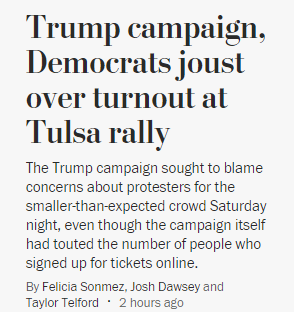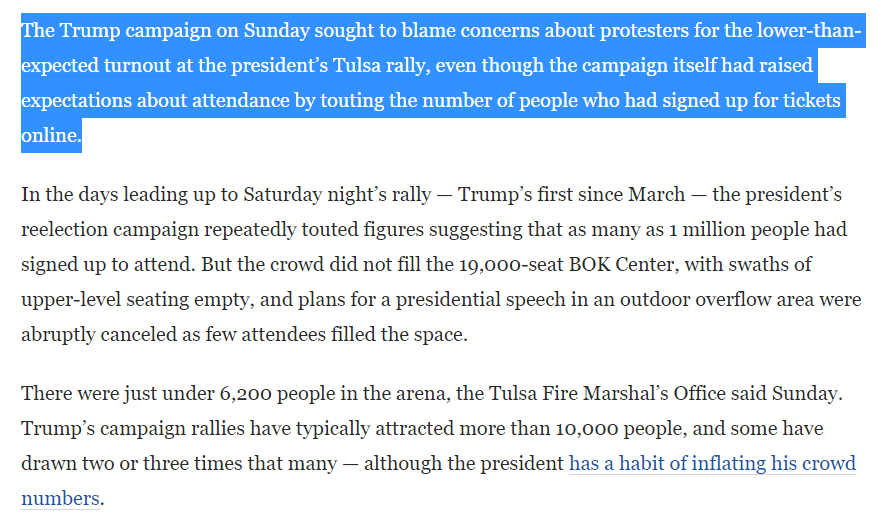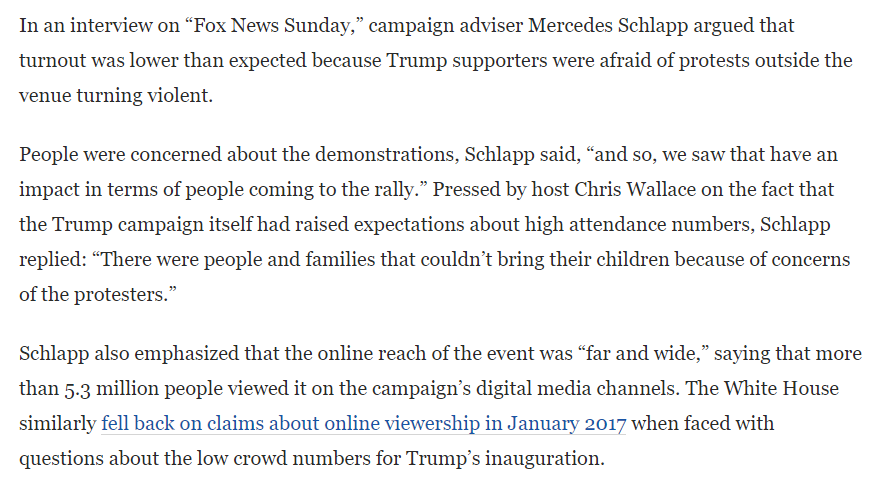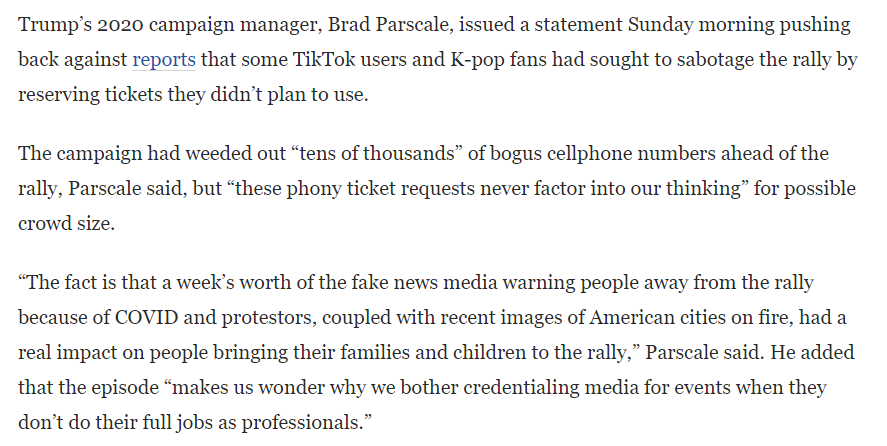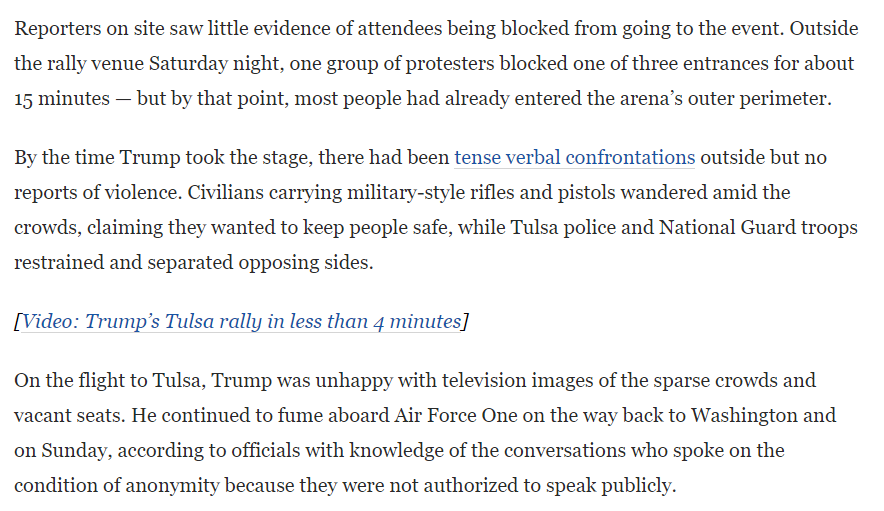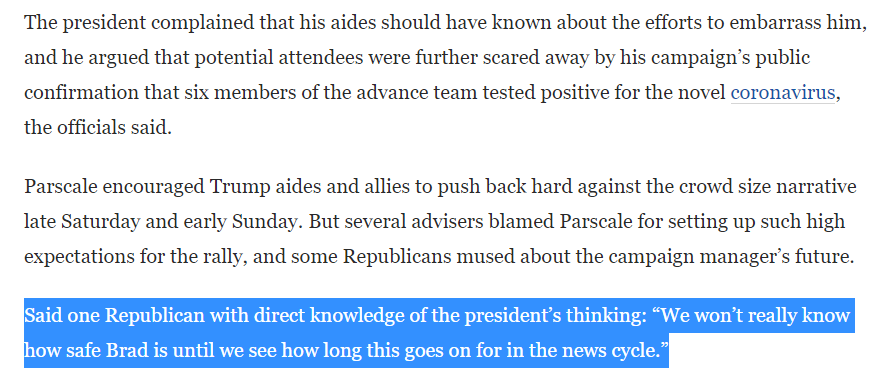This WaPo story about Trump& #39;s rally flop is almost the perfect case study in why our political media is broken, and how it privileges liars. Start with the headline: pure both sides. The story is framed as THE DISPUTE, not an actual event. https://www.washingtonpost.com/politics/trump-campaign-democrats-joust-over-tulsa-rally-turnout/2020/06/21/06ecb95e-b3c8-11ea-a510-55bf26485c93_story.html">https://www.washingtonpost.com/politics/...
Move on to the next three paragraphs of the story. The first few paragraphs lay out the facts that WaPo feels safe publishing, which is, in practice, only the facts that neither party has contested: attendance was low, Trump blamed it on protests, and Trump raised expectations.
The next SIX PARAGRAPHS are devoted to the claims of the Trump campaign, and Trump surrogates: that protesters had kept attendance low, and that stories about social media sabotage were false. Note that these assertions ACTUALLY COME BEFORE THE CLAIMS THEY& #39;RE REBUTTING.
Only in the tenth paragraph do actual reporters contribute anything of their own - the (obvious) observation that there was "little evidence" of hordes of protesters blocking Trump fans from attending. And that claim is immediately qualified. The subject is quickly changed.
The rest of the piece, in reverse pyramid form, is a collection of related information, including comments from various other figures in politics and the admin. But note: these quotes all assume Trump& #39;s explanation is bogus, as it clearly is, despite the paper never saying so.
This is a bizarre, stupid way to structure information! The "dispute" at the core is only resolved by implication, in the tenth paragraph. A reader coming in totally blind would have no particular reason to doubt that there was some truth to Schlapp and Parscale& #39;s excuses.
Why would you write a story this way? Not to communicate true facts or inform readers - it conceals more than it reveals. You write a story this way when you are tying yourself in knots trying to not break a bunch of unwritten rules about political journalism.
First and foremost among those rules is that, in political journalism, no claim contested by either major party can ever be treated as truly true or false. The claim must presented and evidence must be given, but the reader must decide for him or herself.
A corollary is that IF a claim seems to be false, then the people making the false claim must first be given space to lay out their case.
That& #39;s not to help readers - after all, you& #39;re feeding them worthless lies. It& #39;s to shield the paper from claims of bias.
That& #39;s not to help readers - after all, you& #39;re feeding them worthless lies. It& #39;s to shield the paper from claims of bias.
Ultimately, these practices shred the underlying value of journalism.
A story with the thesis "Trump rally is poorly-attended; campaign lies about cause" would be much more accurate than "Trump, Dems clash over rally." What& #39;s more, it& #39;s clear even the WaPo reporters agree.
A story with the thesis "Trump rally is poorly-attended; campaign lies about cause" would be much more accurate than "Trump, Dems clash over rally." What& #39;s more, it& #39;s clear even the WaPo reporters agree.
But because they& #39;re immersed in a bunch of extremely esoteric political reporting rules, in which establishing truth or falsehood of partisan claims is forbidden, these same reporters feel forced to write a story that is of very little practical value to anyone.
Now, obviously, a single story like this, in isolation, doesn& #39;t make much difference. I& #39;m sure most Americans can basically grok what is happening with the crowd-size dispute.
But this is the basic structure of thousands upon thousands of political stories every year.
But this is the basic structure of thousands upon thousands of political stories every year.
Over time, the fact that our politics are presented to the public in this frame has seriously warped our whole politics. It& #39;s made politics into a truth-free zone, in which partisans are rarely punished for completely departing from objective reality.
And in the end, it has eroded, almost entirely, the value of mainstream political reporting. Political reporting makes no attempt anymore to establish who is right and wrong. It only serves as a vector for partisan argument: a quick-hit summary of competing claims.
But if someone wants to read partisan claims, they& #39;re not hard to find. And very few real people want to hear the claims of BOTH parties, presented with a veneer of neutrality. They want to hear the truth, or at least, someone& #39;s version of the truth.
In other words, mainstream political reporting as a useful social enterprise has been subsumed into its own bizarre internal ruleset. It has become a vestigial, solipsistic ritual, by elite writers, for elite writers, and primarily serving to benefit the careers of elite writers.
No wonder people are turning to Facebook, where even the liars are telling it to you straight.
I should add that this is particularly disgraceful because most reporters work very hard to discover what is true, to put the most important true facts at the top, and to communicate usefully to the public.
Why do marquee political writer operate under such very different rules?
Why do marquee political writer operate under such very different rules?
There seems to be a division, in journalism, between people who see their profession as truthseeking, and people who think their job is to run lies through a blender so they can be processed into a formula narrative.
And yet it& #39;s the latter group that gets paid the big bucks.
And yet it& #39;s the latter group that gets paid the big bucks.

 Read on Twitter
Read on Twitter